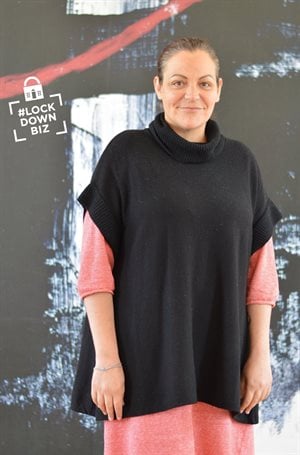
Sofia Neves, managing director at Salesian Life Choices
We chatted to Sofia Neves, managing director at Salesian Life Choices, to get her take.
What was your initial response to the crisis/lockdown?
Sofia Neves: In light of the South African President Cyril Ramaphosa’s National State of Disaster address, we decided to stop all activities on the 18th of March (which is when schools closed). The board and management took a “no risk-taking” approach. Our decision was informed by two fundamentals: (1) our ability to slow down the spread of coronavirus in SA and (2) the health and safety of our beneficiaries and team.
The entire team moved to work from home. We established clear processes, workflows, and put in place deliverables. We planned that team members would communicate with each other on a daily basis. All field staff would continue working with beneficiaries via phone calls and would use the opportunity to talk about Covid-19 basics, answer questions, and promote the desired behaviour of social distancing. We also decided that the Life Choices Academy would continue teaching online and students were given laptops and data to work from home.
The board set up a Covid-19 sub-committee that meets on a weekly basis with me. So, we moved fast and decisively.
Did things go as expected?
Neves: No, since it was difficult for almost everyone to adapt. Everything changed so fast, there was no change management process involved. We just moved and were faced with the daunting task of wanting to continue being as productive as before in a situation that was not conducive to that. The change did not affect a small number of team members - mainly staff without children living in the suburbs - it even increased their productivity. But the rest, we were getting very frustrated between childcare, home schooling, network problems, living conditions not conducive to work, and many more other nuances.
After three weeks, we made the decision of letting everyone go on leave for five days so we could properly adjust to the new conditions. The break was good for the team, everyone returned more grounded and with a good understanding of what was a realistic expectation from each individual during this strange time.
What temporary HR policies have you put in place regarding remote working, health & safety, etc.?
Neves: We are working on a flexi-hour model, with a reduction of hours for parents with children and no reduction of pay. Departments have short meet-ups in the morning to touch base and once a week we have a full organisation virtual meeting where we connect with everyone, a total of 47 staff members. Everyone reports daily on outputs achieved. Therapy sessions continue to be offered, now telephonically, to each member of the team in order to support their wellbeing.
We are beginning to plan going back to the office, but only essential staff will be requested to do so. Whoever can continue working from home will stay home and no team member with a comorbidity will be stepping into the office for the next few months.
How is your organisation responding to the crisis?
Neves: Before sending everyone to work from home, we had a long staff meeting about Covid-19. We continue updating each other on developments, new information, and government initiatives on a daily basis. Independent of what the team is busy doing (e.g. psychosocial support sessions, career guidance, university applications, parental skills), Covid-19 awareness is part of the work.
We were fortunate that over the years we captured thousands of contact numbers of our past beneficiaries. Our new activities include calling each number to provide Covid-19 awareness, emotional support, clarity on government interventions, connection to resources and, in some cases, to provide food vouchers (R800 per family). People are extremely thankful that we haven’t forgotten them. We also have opened psycho-social support services to anyone in need – people can send an SMS or a 'please call me' to 0818178907 and a therapist will call them back.
Comment on the impact of the Covid-19 pandemic on your organisation or economy as a whole.
Neves: Covid-19’s effect on the economy is devastating and will continue for many years to come. I am afraid that inequality will reach levels never seen before. Even though this pandemic affects everyone, it will hit the poor and most vulnerable the hardest. I am extremely supportive of government decisions, including a lockdown as the first response to Covid-19. However, the government is aware that in the worst-case scenario, Covid-19 will not kill as many people as poverty or inequality might do long term. As we are getting more data and knowledge on this virus, the government will need to ease lockdown and boost the economy if they want to avoid an even bigger disaster.
In relation to Life Choices, we have been truly blessed with amazing partners. Many of our donors reached out and recommitted to continue supporting us. Some even offered extra support to assist our Covid-19 response (e.g. food vouchers, data, airtime). We are having real conversations where we are cognisant that the future holds difficult times for organisations and donors. We can’t fully predict what will happen in 2021.
Any trends you’ve seen emerge as a result of the crisis?
Neves: For years, many of the initiatives being implemented by the government now had been debated, torn apart, and dismissed as impassable. In less than two months, Covid-19 has achieved what was unimaginable a few months ago.
The list could go on and on, we could talk about the social grant increase, the establishment of a Covid-19 social relief of distress grant (catering for the forgotten), strengthening the health system, improvement of schools, more social workers and psychologists deployed, financial packages for small businesses in distress, support for industries performing poorly, financial incentives to recover the economy at large, reduction of carbon emissions, improvements in government service delivery through the use of technology, increased public transport, and so much more.
The scale of the response to the pandemic is magnificent, and I hope it can capture the imagination of the collective because it has clearly showcased that where there is a global will, there is a way. What we are learning during this time could assist us in the future to tackle bigger enemies, namely inequality.
What do you predict the next six months will be like?
Neves: Unless a miracle happens, much of the same. Our lives will continue being disrupted. Covid-19 is not going anywhere anytime soon. The government will continue being forced to lift the lockdown but life, as we knew it, will not return. We will need to continue to follow strict health and safety guidelines and a lot of our previous face-to-face work will not be able to be conducted this year.
Marc Lubner, Hedley Lewis, Kelly du Plessis, Lauren Pretorius, Cassey Chambers 4 May 2020
Your key message to those in the sector?
Neves: If your work is still relevant after the Covid-19 era, you will survive. These are daunting times for everyone. Everything and everyone is interconnected – government, businesses, civil society, and communities. We will enter a global crisis of unprecedented proportions and everyone is going to be impacted. But in every crisis, there are opportunities. And that is where the sector will need to focus on, the new opportunities that will emerge.













































